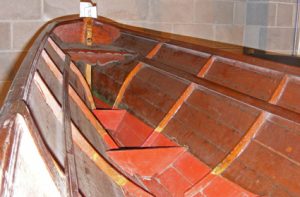
Closely related to the Thames pleasure skiff, the gig was a lightweight upriver version of the Naval pulling gigs.
Gigs and skiffs became popular during the 19th century as a comfortable way to go afloat, especially at the various regattas such as that at Henley.
While similar to the skiff in shape of hull, the essential differences between Thames skiffs and gigs is that a gig is fitted with rowlocks on a gunwale, or on outriggers, whereas the skiff has an extra plank above the gunwale, known as a sax board, with open tholes through which the sculls – oars – are used.
Gigs were normally rowed using a pair of double sculls and were capable of carrying two passengers on ornate caned seats in the stern. The Museum’s example is believed to have been built c.1900, using mahogany and red cedar on oak fames.
Dimensions
Length 7.38m
Beam 1.25m
Depth 0.66m


